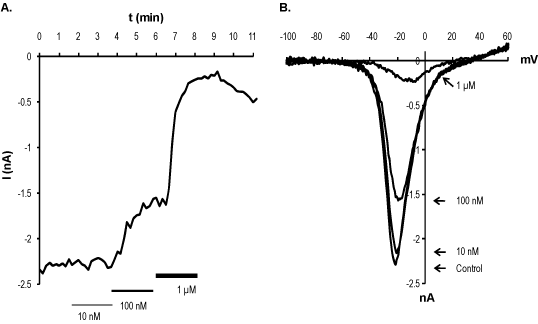Overview
- Jarvis, M.F. et al. (2007) Proc. Natl. Acad. Sci. U.S.A. 104, 8520.
- McGaraughty, S. et al. (2008) J.Pharmacol. Exp. Ther. 324, 1204.
- Sotoodehnia, N. et al. (2010) Nat. Gen. 42, 1068.
 Alomone Labs A-803467 inhibits NaV1.8 channels stably transfected in ND7/23 cells.Currents were elicited by 50 ms voltage ramp from the holding potential of -100 mV to +60 mV, applied every 10 sec, using whole-cell voltage clamp technique. A. Time course of NaV1.8 current amplitude changes as a result of A-803467 (#A-105) application at increasing concentrations, as indicated by the horizontal bars. B. Superimposed traces of NaV1.8 currents under control conditions and after 100 sec perfusion with 10-8-10-6 M A-803467, as indicated.
Alomone Labs A-803467 inhibits NaV1.8 channels stably transfected in ND7/23 cells.Currents were elicited by 50 ms voltage ramp from the holding potential of -100 mV to +60 mV, applied every 10 sec, using whole-cell voltage clamp technique. A. Time course of NaV1.8 current amplitude changes as a result of A-803467 (#A-105) application at increasing concentrations, as indicated by the horizontal bars. B. Superimposed traces of NaV1.8 currents under control conditions and after 100 sec perfusion with 10-8-10-6 M A-803467, as indicated.
The TTX-resistant NaV1.8 channel is expressed almost exclusively in the PNS and has been shown to mediate most of the well documented TTX-resistant currents of DRG neurons' action potentials1. Hyperexcitability, manifested by increased action potential firing and coded information transfer to the CNS of nociceptive DRG neurons, probably lie on the basis of several pathological pain states. Both genetic and pharmacological evidence suggest that NaV1.8 channel might serve as a target in pain control2-4.
A-803467 is a potent and selective blocker of the TTX-resistant NaV1.8 channel4. A-803467 is a state dependent inhibitor with IC50 8 nM at depolarized membrane potential (-40 mV) and 80 nM at -100 mV. As an efficient inhibitor of TTX-resistant currents in DRG neurons, A-803467 was also effective as an analgesic in several rodent models of different pathological pain states4,5. A-803467 was used as a pharmacological tool to demonstrate the expression of NaV1.8 in the heart conduction system and its contribution to QRS interval in the mouse heart6.

